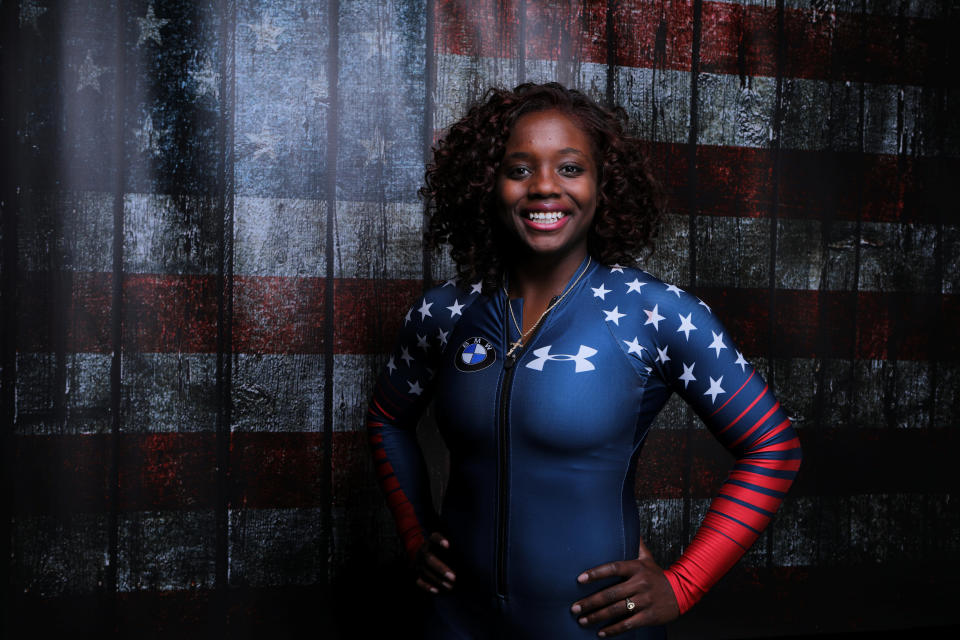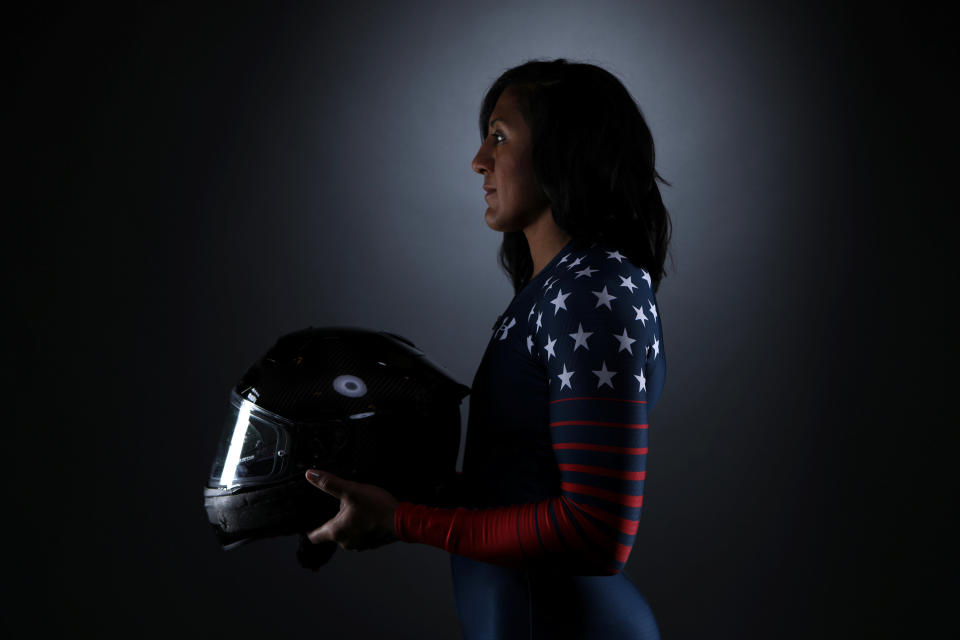Why athlete protests carry a heavy weight for America's Winter Olympians

PARK CITY, Utah – Kehri Jones was walking through an airport in her home state of Texas earlier this year when she accidently bumped into another passenger in a concourse. Her suitcase rolled over the man’s foot and then, she says, he turned to her with a stinging comment.
“Watch it, [racial slur]!”
She offered an apology to the stranger and then called her mother in shock. “It was honestly frightening,” Jones said. “I didn’t know what was coming up next. I just said ‘I’m so sorry.’ ”
The man didn’t know he was hurling a racial epithet at a world-champion American bobsledder. All he knew was her skin color.
“It’s 2017, we’re not supposed to have stuff like that going on,” the 26-year-old Baylor graduate said Monday at the U.S. Olympic media summit here. “It’s still going on. It hurts that people view us that way, even though I’m well-educated, I’m not a mean person, I don’t do drugs, I don’t do the stereotypical stuff they say we do, and I still get a rap for it.”
The athlete protests in NFL games over the weekend were very much a topic here on Monday, but the issues of racism and patriotism are something Jones lives and breathes. Her father has served in the U.S. military for 28 years, and yet she worries about him whether he’s abroad or at home.
“Even my mom, we worry about my dad being in Texas, being a black man, that something is going to happen,” Jones said. “It’s pretty sad that we feel that way every time he leaves. We don’t know what’s going to happen. We don’t know if he gets pulled over, something might happen to my dad, and then I’m left without a dad for the rest of my life. It’s a hard situation.”
Bobsled is a unique sport in the Team USA constellation. It is diverse for a winter sport and becoming more so. Three of the four women who met the media on Monday are people of color. The recent protests have been on their mind, along with the consideration of making their own statement during their time in the spotlight.
“I think we have a really unique opportunity,” said Elana Meyers Taylor, who won medals in Sochi in 2014 and in Vancouver in 2010. “We have a platform. People are going to listen to us just because we’re athletes. I respect what those guys [in the NFL] did, and I believe there is a lot of room for social change. As a person of color I believe it’s something we do need to address.”

Still, Taylor takes the weight of an Olympic protest very seriously. Her dad also served in the military, as a Marine in Kuwait.
“I know he would want me to stand for the national anthem,” she said. “And that’s huge. I highly respect the military and I don’t want to disrespect them in any way, and that’s why I haven’t taken a knee and that’s not something I really would prefer to do.”
Taylor senses the meaning of being an American Olympian has changed somewhat. These Games aren’t quite like the two she competed in before.
“It’s a little bit different,” she said, “because of the expectation to answer for the president’s tweets. That’s never been an expectation in history because we never had Twitter [so prevalent].”
Several athletes had to answer for the president’s tweets on Monday, as his labeling protesters “sons of bitches” at a rally last week in Alabama enraged many in the NFL community and beyond. There is a famous history of Olympic protest – Taylor once had a poster of Tommie Smith on her wall – and the platform in South Korea is literal: a podium and potentially an American national anthem.
“The thought [of a protest] has crossed our mind,” Jones said. “We’re not very big-time athletes, we don’t get a lot of press. But it is something I feel strongly about, the social injustices, and I don’t agree with it. It’s a delicate balance representing the U.S. and wanting to represent your country well, but also wanting to let people know what is going on is not OK.”
U.S. Olympic Committee CEO Scott Blackmun was asked about athlete protests at the opening news conference on Monday and he had a ready answer: “Athletes you see protesting are protesting because they love their country, not because they don’t,” he said. He also mentioned Smith and John Carlos for their 1968 protests and their place in Olympic history.
Some Olympians brushed off the political questions on Monday. Both men’s hockey players, Jordan Greenway and Troy Terry, said they did not plan any sort of statement or protest in February. “I’ve always stood for the national anthem,” said Greenway, “and I always will.”
Yet it’s clear the women’s bobsledders have considered this moment as an opportunity. “My way of showing my stance is to try to be a positive influence for my city, for my country,” said Aja Evans, who is from Chicago. “I’m representing Team USA the best way I can.” But a moment later she added, “Coming from my city you deal with a lot of violence and lately there has been a lot of police brutality. It makes it tough.”
The women’s team spends a lot of time together. The bobsled community is close and there is a lot of travel. (Taylor, when asked where she is based now, admitted, “I have no permanent residence.”) So there is time to talk about their world and the bigger world. “I’m going to have a game-time decision once I’m there, if I’m blessed enough to be there,” Taylor said.
For Jones, though, the moment is now.
“After all this is said and done, I’m going to be another person in the United States that has to deal with everything that’s going on,” she said. “If I don’t use my platform for something bigger, then I’m not using it properly.”
More from Yahoo Sports:
• Army veteran goes against Steelers’ anthem plan
• NFL star makes a joke, gets absurd penalty from refs
• 97-year-old WWII vet takes a knee for NFL players
• Pat Forde: Why haven’t we seen anthem protests in college football?

